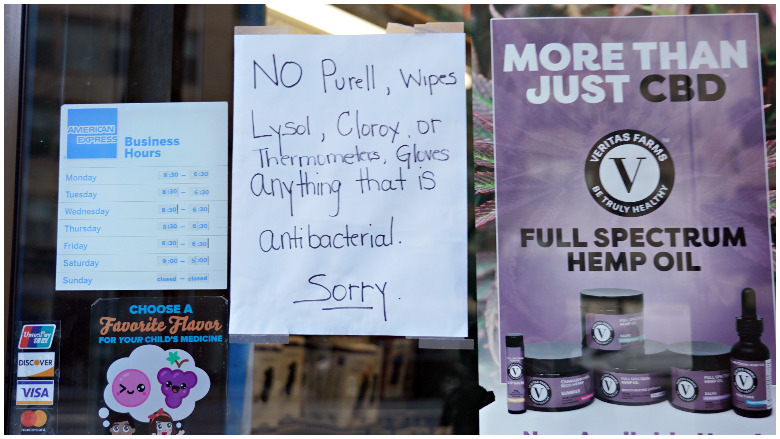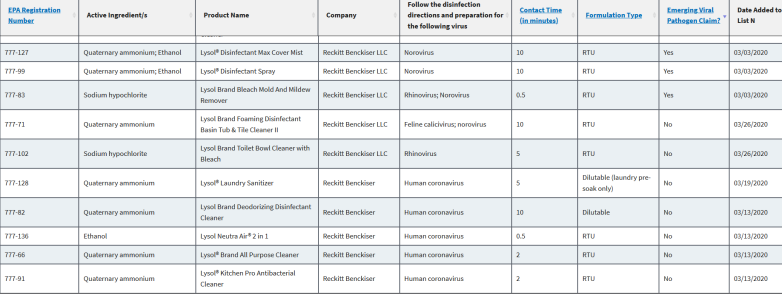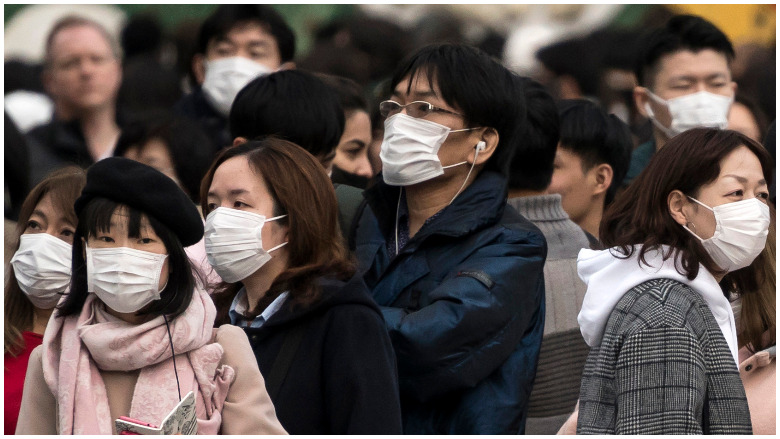
We’re all trying to make sure we disinfect our living environments to protect ourselves and our families from COVID-19 (coronavirus) as much as we can. Obviously, one common disinfectant is Lysol spray (and wipes). Does it work? Does lysol disinfectant spray kill coronavirus?
The United States Environmental Protection Agency has released an expanded list of disinfectants and cleaners that destroy COVID-19. Multiple Lysol products, including Lysol disinfectant spray, are on that list, and you can see them later in this article. In addition, the Centers for Disease Control and Prevention has a simple recipe for a bleach-and-water mixture that also kills the virus, which you can also see later in this article. The virus spreads through respiratory drops and can live on surfaces, so it’s important to disinfect, the CDC advises. The EPA list is known as “List N.”
“When purchasing a product, check if its EPA registration number is included on this list. If it is, you have a match and the product can be used against SARS-CoV-2. You can find this number on the product label – just look for the EPA Reg. No. These products may be marketed and sold under different brand names, but if they have the same EPA registration number, they are the same product,” the EPA states.
You can find the full list here.
CNet even suggests that you use Lysol spray to disinfect your sofa and carpets, and wipes to clean counters and other objects. The site notes that 409 cleaner is not an approved disinfectant for coronavirus. (Here are details on how you can sanitize groceries.)
Here’s what you need to know:
There Are Multiple Lysol Products on the EPA’s List

EPAThe EPA list showing approved Lysol products that kill coronavirus
The list above comes from the EPA database of cleaners that kill coronavirus. The list is constantly updated, and it was last updated on March 26, 2020. Here are the remaining entries for Lysol products:

The EPA list showing approved Lysol products that kill coronavirus
Here’s the list:
Lysol Bathroom Cleaner
Lysol Brand Bleach Mold And Mildew Remover
Lysol Brand Clean & Fresh Multi-surface Cleaner
Lysol Brand Cling & Fresh Toilet Bowl Cleaner
Lysol Brand Deodorizing Disinfectant Cleaner
Lysol Brand Foaming Disinfectant Basin Tub & Tile Cleaner II
Lysol Brand Heavy Duty Cleaner Disinfectant Concentrate
Lysol Brand Lime & Rust Toilet Bowl Cleaner
Lysol Brand Power Plus Toilet Bowl Cleaner
Lysol Brand Toilet Bowl Cleaner with Bleach
Lysol Neutra Air® 2 in 1
Lysol® Brand All Purpose Cleaner
Lysol® Disinfectant Max Cover Mist
Lysol® Disinfectant Spray
Lysol® Disinfecting Wipes (All Scents)
Lysol® Kitchen Pro Antibacterial Cleaner
Lysol® Laundry Sanitizer
According to MyRecipes, Lysol has been helping eradicate viruses for decades. It was invented in 1889 in Germany to help with a cholera epidemic and was also important during the Spanish flu pandemic, the site reports. If you can’t find Lysol products, Clorox products can work too. According to USA Today, it’s recommended that you choose cleaners with at least 70% alcohol,
“This list includes products with emerging viral pathogen claims and those with human coronavirus claims. If a product with an emerging viral pathogen claim is not available, use a product with a coronavirus claim. If the product is listed as ‘N’ under the Emerging Viral Pathogen Claim column, then it has a human coronavirus claim,” EPA states, noting, “Inclusion on this list does not constitute an endorsement by EPA. There may be additional disinfectants that meet the criteria for use against SARS-CoV-2. EPA will update this list with additional products as needed.”
There are more than 270 entries on the EPA’s list.
“Based on what is currently known about the novel coronavirus and similar coronaviruses that cause SARS and MERS, spread from person-to-person with these viruses happens most frequently among close contacts (within about 6 feet). This type of transmission occurs via respiratory droplets,” the Centers for Disease Control and Prevention says.
“On the other hand, transmission of novel coronavirus to persons from surfaces contaminated with the virus has not been documented. Transmission of coronavirus occurs much more commonly through respiratory droplets than through fomites. Current evidence suggests that novel coronavirus may remain viable for hours to days on surfaces made from a variety of materials. Cleaning of visibly dirty surfaces followed by disinfection is a best practice measure for prevention of COVID-19 and other viral respiratory illnesses in households and community settings.”
The CDC adds: “Community members can practice routine cleaning of frequently touched surfaces (for example: tables, doorknobs, light switches, handles, desks, toilets, faucets, sinks) with household cleaners and EPA-registered disinfectants that are appropriate for the surface, following label instructions. Labels contain instructions for safe and effective use of the cleaning product including precautions you should take when applying the product, such as wearing gloves and making sure you have good ventilation during use of the product.”
The CDC Also Says a Bleach & Water Mixture to Kill Coronavirus

Getty
If you can’t find Lysol products anymore, bleach can also work. According to CDC:
“Most common EPA-registered household disinfectants will work. Use disinfectants appropriate for the surface.
Options include:
Diluting your household bleach.
To make a bleach solution, mix:
5 tablespoons (1/3rd cup) bleach per gallon of water
OR
4 teaspoons bleach per quart of water
Follow manufacturer’s instructions for application and proper ventilation. Check to ensure the product is not past its expiration date. Never mix household bleach with ammonia or any other cleanser. Unexpired household bleach will be effective against coronaviruses when properly diluted.
Alcohol solutions.
Ensure solution has at least 70% alcohol.”
How can you clean surfaces?
“Wear disposable gloves when cleaning and disinfecting surfaces. Gloves should be discarded after each cleaning. If reusable gloves are used, those gloves should be dedicated for cleaning and disinfection of surfaces for COVID-19 and should not be used for other purposes. Consult the manufacturer’s instructions for cleaning and disinfection products used. Clean hands immediately after gloves are removed,” the CDC advises.
“If surfaces are dirty, they should be cleaned using a detergent or soap and water prior to disinfection. For disinfection, diluted household bleach solutions, alcohol solutions with at least 70% alcohol, and most common EPA-registered household disinfectants should be effective.”
The CDC continues, “Diluted household bleach solutions can be used if appropriate for the surface. Follow manufacturer’s instructions for application and proper ventilation. Check to ensure the product is not past its expiration date. Never mix household bleach with ammonia or any other cleanser. Unexpired household bleach will be effective against coronaviruses when properly diluted.”
According to CDC, you should prepare a bleach solution by mixing:
5 tablespoons (1/3rd cup) bleach per gallon of water or
4 teaspoons bleach per quart of water
“Products with EPA-approved emerging viral pathogens are expected to be effective against COVID-19 based on data for harder to kill viruses. Follow the manufacturer’s instructions for all cleaning and disinfection products (e.g., concentration, application method and contact time, etc.),” says CDC. “For soft (porous) surfaces such as carpeted floor, rugs, and drapes, remove visible contamination if present and clean with appropriate cleaners indicated for use on these surfaces. After cleaning: Launder items as appropriate in accordance with the manufacturer’s instructions. If possible, launder items using the warmest appropriate water setting for the items and dry items completely, or use products with the EPA-approved emerging viral pathogens claims that are suitable for porous surfaces.”
READ NEXT: Can You Get Coronavirus From Money?